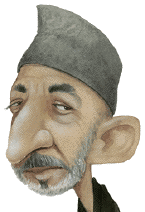Adil Najam
The summit meeting tomorrow between US President Obama, Pakistan President Zardari and Afghanistan President Karzai could clearly be amongst the most important events on what is being called the Af-Pak front, and possibly in defining the future of the so-called ‘War on Terror.’
I believe that this could not just be an important step forward; it could be a good step forward. It is traversity of basic logic for for so long these three countries – USA, Pakistan, Afghanistan – have supposedly been ‘allies’ in a critical war supposedly against the same enemy (terrorism), and yet there has been no real forum of strategy and policy coordination between them. Indeed, it is a measure of the absurdity of this trilateral relationship that this will really be the first ever strategic meeting between the three countries at the summit level (Presidents Bush, Musharraf and Karzai had met, but never really to discuss policy coordination and joint strategy).
It may be asking for too much, but one does hope that this will indeed be a real policy coordination and strategy development discussion and not just finger-pointing and scolding on the part of Presidents Obama and damage deflection and passing the blame on the part of Presidents Zardari and Karzai. The stakes for all three are high – indeed, the stakes are high for the whole world.
U.S. policy in the region – including its ill-guided drone attacks into Pakistan – has clearly been a failure
that has not achieved any of the stated US strategic goals. And the last thing President Obama wants to be doing is to be seen to be continuing the Bush legacy in the region. He needs to show to his own people, but also to Pakistan and Afghanistan that his policy is different from George Bush’s and also that it will work. For its part, Pakistan stands at the brink of disaster with its internal politics in disarray, its military’s morale and repute in question, and growing infuence of the Taliban in society. Mr. Zardari will need to demonstrate to his US hosts as well as his own public that he remains in control of Pakistan and in a position of actually doing something about the imminent threats to Pakistan. Hamid Karzai’s standing is no better.The charge against him is that he is merely the “mayor of Kabul,” but some suggest that he may not even have that much control, and whatever control he has may also slip away in the forthcoming elections.
All three have their work cut out for them. In very different ways the pressure will be on all three. In the case of Mr. Zardari and Mr. Karzai, even their jobs may be on the line. That is not so for Mr. Obama, but the stakes for him are also very high. One hopes that their discussion will go beyond diplomatic niceities but also not degenerate into recriminations and accusations. One hopes that it will be frank and forthright, with all three being willing to say and hear some tough love. But most of all one hopes that they will roll up their sleeves and focus not as much on who has not done what (none of the three parties has done much to be very proud of in this region) but on what needs to be done. The tragedy of this trio is not just that all three countries – USA, Pakistan, Afghanistan – have failed to do the right thing, it is that none of the three have any idea about what the right thing to do is. Neither does anyone else. This is why it is so very important for the three leaders to begin devising a real joint strategy whose purpose is not merely to control the impulses of the other in a climate of mutual distrust, but to tackle the common and growing threat of extremism, militancy and terrorism.























































Mr.Najam, i came up with an article you wrote for the website “chowk” about 10 years back titled “Education Apartheid”
http://www.chowk.com/articles/4138
This is such an important issue, which no on seems to be interested in. Can you please write on it again? maybe write also for one of the major dailies? I strongly feel that we cannot go anywhere as a nation until we address this issue. It is an issue of justice and basic human rights, at least in the present age.
regards
One very important point that is missing almost everywhere is the issue of Afghan soil being used to destabilize Pakistan, especially by India. Pakistan needs to play its part by preventing militants from crossing over to Afghanistan and creating chaos there, but the US and Afghanistan also have a responsibility not to let India fund and arm the Baluchistan insurgents and other elements creating trouble in Pakistan.
This is one point that we Pakistanis should loudly and clearly raise at every available forum, just like we clearly speak against the drone attacks at every opportunity.
Also, its totally ridiculous how Zardari seems willing to sign a transit trade agreement without asking for any quid pro quo. It makes no sense for us to allow Indian goods to be taken to Afghanistan through Pakistan unless India gives us something concrete in return. We need to conduct our foreign policy professionally rather than unilaterally throwing away major concessions and expecting that sycophancy alone (latest example: Zardari’s ridiculous statement that Hilary Clinton is a beakon of hope for the world) will make others melt and start being generous towards Pakistan. Frankly, I think we are totally screwed in foreign policy under Zardari and the PPP. ZAB would be turning in his grave at this.
Good analysis of the trip in THE NEWS:
The achievements and embarrassments of Zardari visit
Sunday, May 10, 2009
By Shaheen Sehbai
WASHINGTON: Three major outcomes of the bilateral and trilateral summit talks between Presidents Zardari, Obama and Karzai are now becoming visible as officials of the three countries hammer out details of how much money would be poured in, how it would be spent and how it would be monitored.
According to officials and experts involved in the intense talks and negotiations, the broader picture emerging from the Zardari visit includes the following three conclusions:
* The tensions in relations between President Asif Zardari and President Karzai of Afghanistan have been removed and both have developed a good and cordial working relationship because both are being asked by President Obama to meet almost similar benchmarks, both are looked at suspiciously and are not fully trusted with money and both are believed to be unpopular and weak. In fact in so many ways, President Zardari has been forced to stand in the much smaller league of Karzai.
* The Americans have decided to pump in a lot of money into Pakistan, almost 1.9 billion dollars into non-military development sectors this year and $ 1.5 billion annually later. The Congress and the Executive Branch agree on this and the process of authorisations will move quickly through the House and Senate and the president will sign the laws without any delay. But the Pakistanis have been forced to accept a disbursement and oversight mechanism which will be very different from the years of General Musharraf when dollars were sent and no one knew where they were being spent.
* The Americans have succeeded, almost, in convincing President Zardari and to a great degree the Pakistan Army, that India is not playing a negative role in Afghanistan and Pakistan should not be unduly concerned. The Indian role, the Americans tried to assure the Pakistanis, was one to help both Afghanistan and Pakistan to overcome the Taliban menace and not to weaken Pakistan.
These three larger outcomes have a lot of highly controversial and even outrightly embarrassing details which the Pakistanis may find hard to explain to their domestic critics and experts. The devil is in the detail, it is said, and this cliche fits exactly in the current situation.
On relations between Karzai and Zardari, although it is now certain that Washington will back Karzai for his re-election, many still believe he would be a puppet and not control anyone and anything outside Kabul and his Green Zone. So equating Karzai with President Zardari is basically pulling a democratically-elected president of a vibrant country down to the level of a puppet. Why has President Zardari agreed to come to this level remains to be explained.
The long standing argument of Pakistan that Karzai should do more to control his border and influx of fighters into Pakistan has apparently been set aside.
The issue of spending money is more critical and embarrassing. Not only the Americans are going to put a monitoring system in Pakistan, maybe in the American Embassy in Islamabad with an authorised official, the Congress is also insisting on its own oversight.